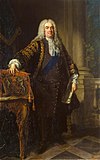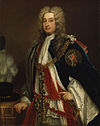William Cavendish, 2nd Duke of Devonshire
Appearance
The Duke of Devonshire | |
|---|---|
 Portrait by Godfrey Kneller | |
| Lord President of the Council | |
| In office 6 July 1716 – 16 March 1718 | |
| Monarch | George I |
| Preceded by | The Earl of Nottingham |
| Succeeded by | The Earl of Sunderland |
| In office 27 March 1725 – 4 June 1729 | |
| Monarchs | George I George II |
| Preceded by | The Lord Carleton |
| Succeeded by | The Lord Trevor |
| Personal details | |
| Born | 1672 |
| Died | 4 June 1729 (aged 56–57) |
| Nationality | British |
| Political party | Whig |
| Spouse | Rachel Russell |
| Children | William Cavendish, 3rd Duke of Devonshire Lady Rachel Cavendish Lady Elizabeth Cavendish Lord James Cavendish Lord Charles Cavendish |
| Parent(s) | William Cavendish, 1st Duke of Devonshire Lady Mary Butler |
William Cavendish, 2nd Duke of Devonshire KG, PC (1672 – 4 June 1729) was a British nobleman and politician. He was the eldest son of William Cavendish, 1st Duke of Devonshire and Lady Mary Butler. A prominent Whig, he was sworn of the Privy Council in 1707, and served as Lord President of the Council from 1716 to 1718 and 1725 to 1729.
He married The Hon. Rachel Russell (1674–1725), daughter of William Russell, Lord Russell on 21 June 1688. The Duchess served as a Lady of the Bedchamber at the court of Queen Anne.[1]
They had ten children:
- Lady Mary Cavendish (18 August 1696 – 15 June 1719)[2]
- William Cavendish, 3rd Duke of Devonshire (26 September 1698 – 5 December 1755)
- Lady Rachel Cavendish (4 October 1699 – 18 June 1780)[3] married Sir William Morgan on 14 May 1723
- Lady Elizabeth Cavendish (27 September 1700 – 7 November 1747) married Sir Thomas Lowther, 2nd Baronet
- Lord James Cavendish (23 November 1701 – 14 December 1741)
- Lord Charles Cavendish (17 March 1704 – 28 April 1783) married Anne Grey on 9 January 1727, father of Henry Cavendish
- Lady Anne Cavendish (died 23 August 1780 aged 70[4])
- Lady Katherine Cavendish (died 12 September 1715 aged 9[5])
- Lord John Cavendish (died 11 May 1720 aged 12[6])
- Lady Diana Cavendish (died 12 February 1722[7])
References
[edit]- ^ "Warrant Books: April 1713, 1–15 Pages 169–184 Calendar of Treasury Books, Volume 27, 1713. Originally published by Her Majesty's Stationery Office, London, 1955". British History Online. Retrieved 13 July 2020.
- ^ England, Select Births and Christenings, 1538–1975
- ^ Jervas, Charles. "Lady Rachel Cavendish, Lady Morgan (1697–1780), as a Shepherdess". National Trust.
- ^ Cox, John Charles (1881). "The Chronicles of the Collegiate Church or Free Chapel of All Saints, Derby".
- ^ Cox, John Charles (1881). "The Chronicles of the Collegiate Church or Free Chapel of All Saints, Derby".
- ^ Cox, John Charles (1881). "The Chronicles of the Collegiate Church or Free Chapel of All Saints, Derby".
- ^ Cox, John Charles (1881). "The Chronicles of the Collegiate Church or Free Chapel of All Saints, Derby".
Categories:
- 1672 births
- 1729 deaths
- Cavendish family
- Dukes of Devonshire
- English MPs 1695–1698
- English MPs 1698–1700
- English MPs 1701
- English MPs 1701–1702
- English MPs 1702–1705
- English MPs 1705–1707
- Garter Knights appointed by Anne
- Lord-lieutenants of Derbyshire
- Lord Presidents of the Council
- Members of the Privy Council of Great Britain
- People from Derbyshire
- Great Britain MP (1707–1800) for England stubs



